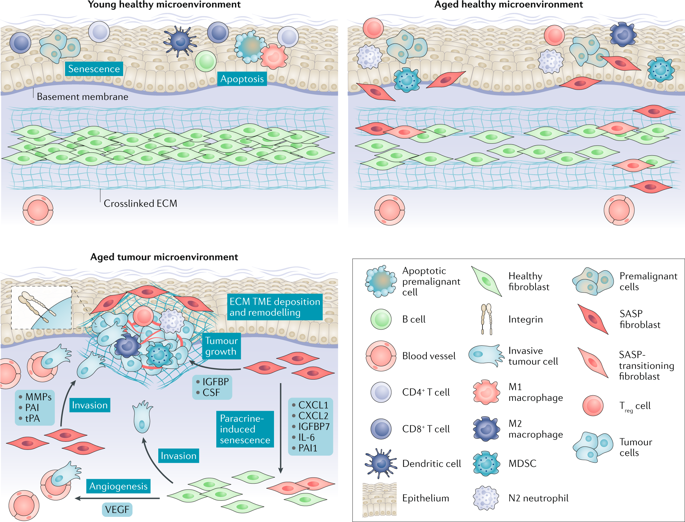当前位置:
X-MOL 学术
›
Nat. Rev. Cancer
›
论文详情
Our official English website, www.x-mol.net, welcomes your
feedback! (Note: you will need to create a separate account there.)
How the ageing microenvironment influences tumour progression.
Nature Reviews Cancer ( IF 72.5 ) Pub Date : 2019-12-13 , DOI: 10.1038/s41568-019-0222-9 Mitchell Fane 1, 2 , Ashani T Weeraratna 1, 2, 3
Nature Reviews Cancer ( IF 72.5 ) Pub Date : 2019-12-13 , DOI: 10.1038/s41568-019-0222-9 Mitchell Fane 1, 2 , Ashani T Weeraratna 1, 2, 3
Affiliation

|
Most cancers arise in individuals over the age of 60. As the world population is living longer and reaching older ages, cancer is becoming a substantial public health problem. It is estimated that, by 2050, more than 20% of the world's population will be over the age of 60 - the economic, healthcare and financial burdens this may place on society are far from trivial. In this Review, we address the role of the ageing microenvironment in the promotion of tumour progression. Specifically, we discuss the cellular and molecular changes in non-cancerous cells during ageing, and how these may contribute towards a tumour permissive microenvironment; these changes encompass biophysical alterations in the extracellular matrix, changes in secreted factors and changes in the immune system. We also discuss the contribution of these changes to responses to cancer therapy as ageing predicts outcomes of therapy, including survival. Yet, in preclinical studies, the contribution of the aged microenvironment to therapy response is largely ignored, with most studies designed in 8-week-old mice rather than older mice that reflect an age appropriate to the disease being modelled. This may explain, in part, the failure of many successful preclinical therapies upon their translation to the clinic. Overall, the intention of this Review is to provide an overview of the interplay that occurs between ageing cell types in the microenvironment and cancer cells and how this is likely to impact tumour metastasis and therapy response.
中文翻译:

衰老微环境如何影响肿瘤进展。
大多数癌症发生在 60 岁以上的人群中。随着世界人口寿命的延长和老龄化,癌症正在成为一个重大的公共卫生问题。据估计,到2050年,全球超过20%的人口将超过60岁——这可能给社会带来的经济、医疗和财政负担绝非微不足道。在这篇综述中,我们探讨了衰老微环境在促进肿瘤进展中的作用。具体来说,我们讨论了衰老过程中非癌细胞的细胞和分子变化,以及这些变化如何有助于肿瘤生长的微环境;这些变化包括细胞外基质的生物物理变化、分泌因子的变化和免疫系统的变化。我们还讨论了这些变化对癌症治疗反应的贡献,因为衰老可以预测治疗结果,包括生存率。然而,在临床前研究中,衰老微环境对治疗反应的影响在很大程度上被忽视,大多数研究是在 8 周龄小鼠中设计的,而不是反映与所建模疾病年龄相适应的年龄较大的小鼠。这可以部分解释许多成功的临床前疗法在转化为临床后的失败。总体而言,本综述的目的是概述微环境中衰老细胞类型与癌细胞之间发生的相互作用,以及这可能如何影响肿瘤转移和治疗反应。
更新日期:2019-12-13
中文翻译:

衰老微环境如何影响肿瘤进展。
大多数癌症发生在 60 岁以上的人群中。随着世界人口寿命的延长和老龄化,癌症正在成为一个重大的公共卫生问题。据估计,到2050年,全球超过20%的人口将超过60岁——这可能给社会带来的经济、医疗和财政负担绝非微不足道。在这篇综述中,我们探讨了衰老微环境在促进肿瘤进展中的作用。具体来说,我们讨论了衰老过程中非癌细胞的细胞和分子变化,以及这些变化如何有助于肿瘤生长的微环境;这些变化包括细胞外基质的生物物理变化、分泌因子的变化和免疫系统的变化。我们还讨论了这些变化对癌症治疗反应的贡献,因为衰老可以预测治疗结果,包括生存率。然而,在临床前研究中,衰老微环境对治疗反应的影响在很大程度上被忽视,大多数研究是在 8 周龄小鼠中设计的,而不是反映与所建模疾病年龄相适应的年龄较大的小鼠。这可以部分解释许多成功的临床前疗法在转化为临床后的失败。总体而言,本综述的目的是概述微环境中衰老细胞类型与癌细胞之间发生的相互作用,以及这可能如何影响肿瘤转移和治疗反应。











































 京公网安备 11010802027423号
京公网安备 11010802027423号